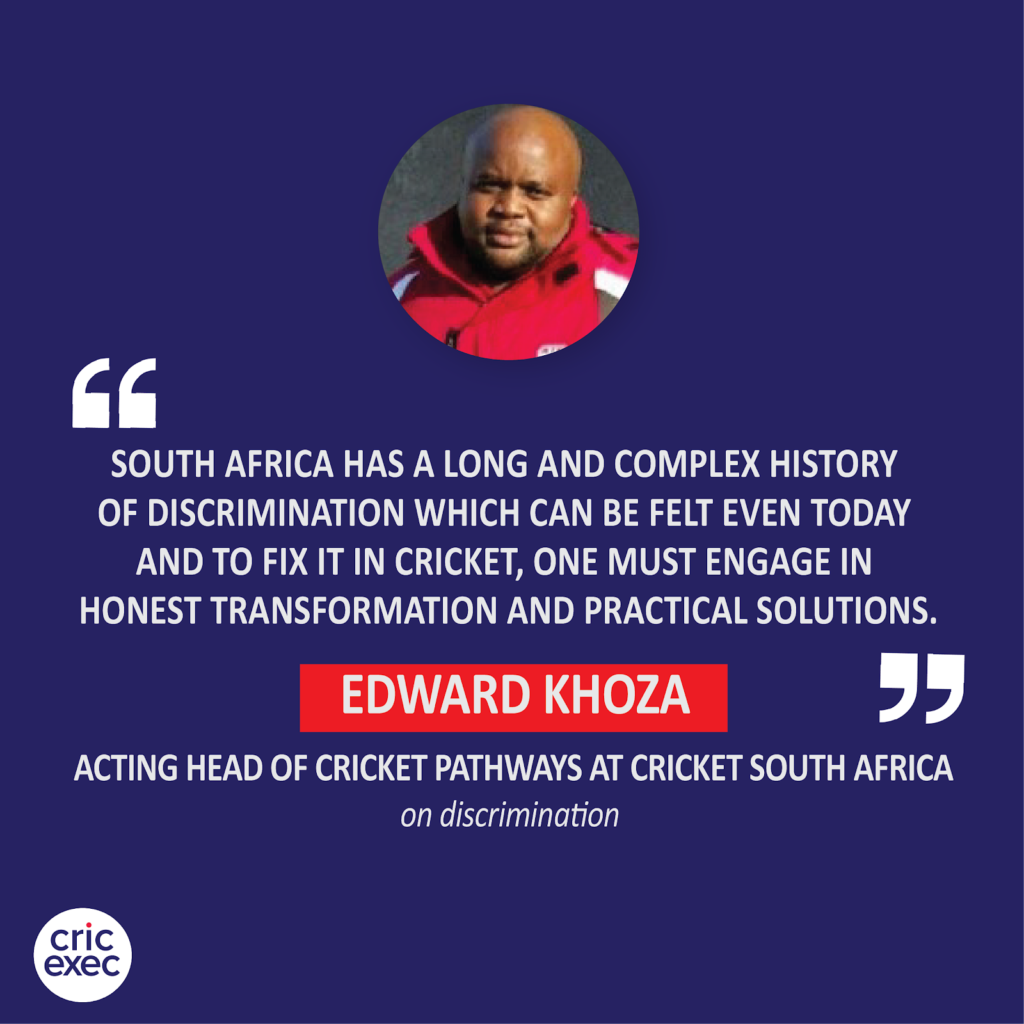Photo Credit: Cricket South Africa
Even at a young age, Cricket South Africa’s (CSA) Acting Head of Cricket Pathways, Edward Khoza, was determined to become a cricket administrator to bring about transformational changes in the sport.
“When I was younger, I played various sports, including soccer, but what won me over to join the then Bakers Mini-Cricket programme was the biscuit and orange given to us before each match. The cricket-bug bit me and by the age of 15, I was part of the administration team for a local club in Mamelodi and when I attended meetings, I was the only young black person in those meetings. I vowed then and there that I needed to change that,” says Khoza.
Khoza has been playing his part in making cricket more inclusive for over 19 years, with the last seven years spent at CSA, heading up various strategic programmes that ensure the incubation and flow of young talent such as coaches, umpires and players transitioning into professional cricket.
CSA has been accused of a lack of transformation not just on the cricket pitch when considering the national cricket team, the Proteas, but on its administrative side too.
But Khoza says those criticising the lack of diversity at CSA, and specifically in the national team, are not seeing the whole picture.
“South Africa has a long and complex history of discrimination which can be felt even today and to fix it in cricket, one must engage in honest transformation and practical solutions. Black Africans continue to face a host of socio-economic challenges including neglected sports and recreation facilities, no electricity to practise after dark, and a lack of funds to buy equipment or to attend the ‘right schools’ to be selected.

Photo Credit: LinkedIn profile photo of Edward Khoza
“Over and above that, Black Africans often have to give up on their cricket dreams to find a job after completing school. Because of the lack of suitably experienced and qualified players such as specialist batsmen, it is not enough to simply place people in positions for the sake of filling targets. That approach sets the players and the game of cricket up for failure.
“Part of addressing those past discrepancies involves nurturing, grooming and retaining the talent we want to see, especially amongst Black African batters. We are tirelessly working toward increasing our selection pool because we cannot fill the gaps if we do not have a sufficient pool of talent to choose from,” explains Khoza.
He adds that CSA has also transformed in recent years to be more reflective of the country’s demographics, with more than 75% of the board and senior management comprising women and Africans.
To ensure a steady supply of cricket talent, Khoza and his team at CSA have embarked on a series of programmes and strategies that focus on discovering and nurturing talent from all over South Africa – including previously disadvantaged backgrounds and affluent neighbourhoods, alike.
These programmes include 69 Cricket Hubs and Regional Performance Centres located close to cricket playing schools that meet CSA targets. These requirements include getting players match-ready by exposing players to a minimum of 20 games a season. Every participating school must have a minimum of two Black African children on their team.
A School Quality Index, which assesses whether schools have players of colour in their cricket teams, and Player Performance Plans are aimed at closing the skills gap between players that come from affluent backgrounds and those from previously disadvantaged ones.
Khoza says CSA’s well-defined and clear roadmap is ensuring that more Black African cricketers are being produced, especially batters, and when ready, will be channelled into the national squad. For Khoza, T20 competitions, which are well represented by South Africa’s demographics, are proof that the talent pipeline is working, although he is pushing to expedite the process.
Initiatives such as the KFC Mini-Cricket Programmes in association with CSA, are also exposing more children to cricket, with over 124,000 children playing in more than 42,000 matches nationwide every year.
On the women’s cricket front, Khoza says CSA recently appointed a female coach to look after the National Women’s Academy and the cricket authority is preparing for the U19 Women’s World Cup.
Khoza remains perpetually committed and passionate about cricket and its administration. He says he owes his first career break to the sport, and believes everybody has the potential to make a difference in the game, whether as a coach, umpire, player or administrator.
“I am a huge advocate of the game but also about ‘life after cricket’. Part of what we do at Cricket South Africa, and especially in my department, is to ensure that when players and coaches leave the fraternity, they are in a much better position than when they started. We provide support to players, coaches and umpires, ensuring they have the skills, knowledge and expertise to not only thrive in cricket but also outside of it,” Khoza concludes.
FACTS:
– Cricket South Africa invested R385 million in cricket transformation and development in the 2019/2020 financial year.
– CSA met its transformation target at the development level in the 2019/2020 season.
– 81.25% of its full-time CSA employees are Black (that is 52 of the 64 staff).
– The current President, Chairman of the Board, and CEO are Black.
– 83.33% of its Board members are Black (that is 10 of the 12 members), and half are Black Africans.
– 93.49% of the nationally accredited men’s coaches in South Africa are Black (that is 244 of 261 coaches).
– 60% of the nationally accredited women’s coaches are Black (that is 9 of 15).
– 62.60% of the nationally accredited male referees and umpires in the men’s game are Black (that is 72 of 115).
– 40% of the umpires and referees in the women’s game are Black (that is 6 of 15).
CSA also supports:
– 612 township-based cricket clubs,
– 1,052 township primary school cricket clubs, and
– 572 township high school cricket clubs.

















































